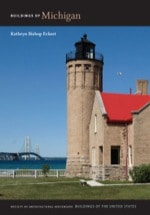
Standing south of a residential area containing Ludington's grandest late-nineteenth- and early-twentieth-century houses and west of the public library is the post office. It was built during the Great Depression, under the auspices of the Public Works Administration (PWA). The high-style classical building with a formal and balanced facade is an elegant monument that speaks of the federal presence in Ludington. The main entrance is placed in the center of a five-bay central pavilion and is topped with a broken pediment. The other four bays are filled by round-headed double windows, each of which is surmounted by an arched fanlight. An engaged Ionic order defines the bays of the central pavilion. The brick building has a balustraded mansard roof pierced by dormers; the short corner wings are quoined.

